Antonio Ray Harvey
Shirley Weber Sworn in as California’s First Elected Black Secretary of State
The Secretary of State is the chief elections officer of the state, responsible for overseeing and certifying elections, as well as testing and certifying voting equipment for use in California. Weber’s duties also include overseeing the state’s archives division and registry of businesses.
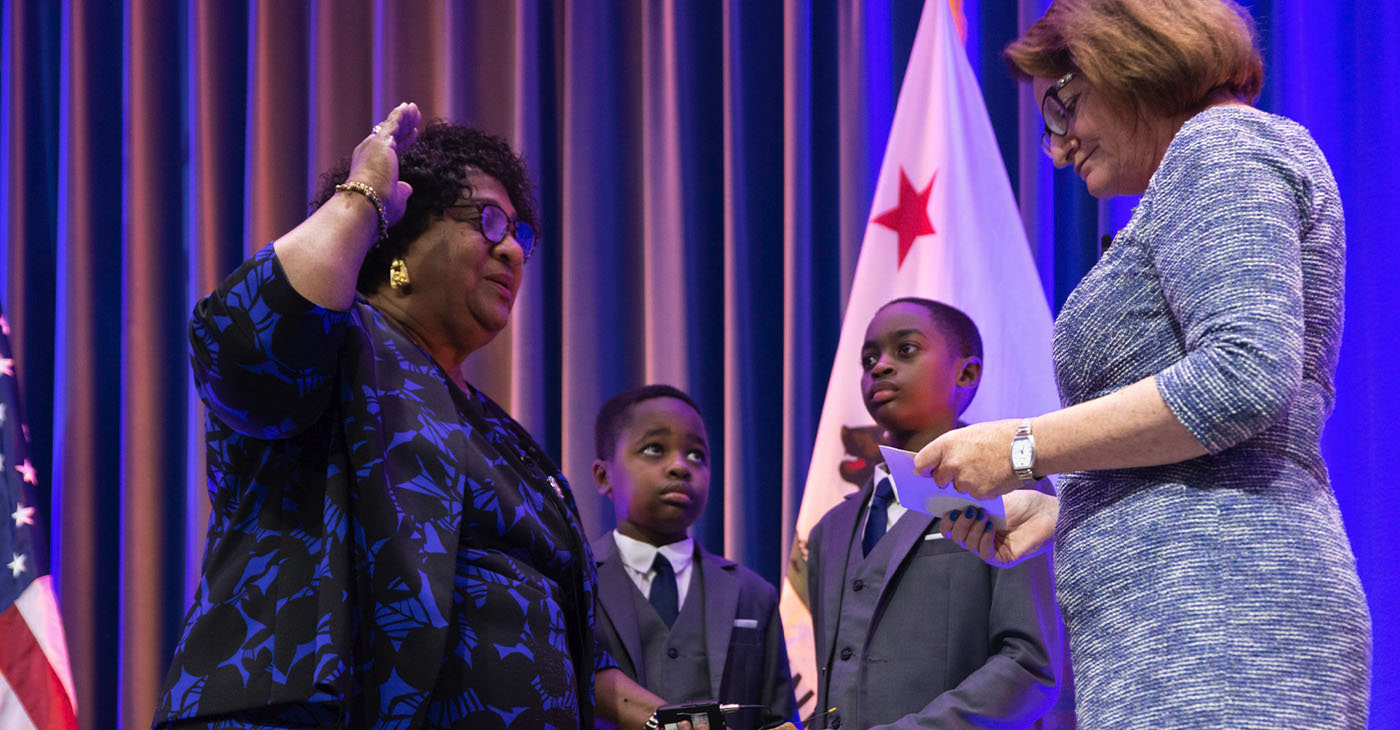
By Antonio Ray Harvey, California Black Media
On Jan. 9, with the sound of African drumming in the background, Shirley Weber was sworn in as the first elected Black Secretary of State (SOS) of California and the 32nd person to hold the position.
The ceremony was conducted at the SOS’ auditorium in downtown Sacramento, one block south of the State Capitol.
Senate President pro Tempore Toni G. Atkins (D-San Diego) administered the oath of office in front of Weber’s grandsons Kadir and Jalil Gakunga.
“I want to thank all of those who work so hard to make this position, the Secretary of State — and all of those wonderful things that come with it — possible, and for being in my life,” Weber said. “I have been blessed beyond imagination with all of the good things California has to give.”
The daughter of a sharecropper from Hope, Arkansas, Weber said she is “not supposed to be here” as the state’s chief clerk, overseeing a department of 500-plus employees.
Weber grew up in a two-room, “clapboard house” in Arkansas with her parents and five other siblings before the family relocated to Los Angeles where they lived in Pueblo Del Rio, a housing project known as the “pueblos.”
Weber said the “data” projected that she would not have a bright future. Still, she went on to graduate from UCLA with a PhD, serve on the San Diego Board of Education, teach African American studies at San Diego State University, and successfully run for California State Assembly in November 2012.
“My father came from Hope, Arkansas, because there was no hope in Hope,” Weber said. “He came to California because he wanted his children to have a better chance and a better life.”
When Gov. Gavin Newsom appointed Alex Padilla the state’s junior U.S. Senator in January 2021, he nominated Weber as SOS. Padilla filled in for Sen. Kamala Harris, who had been elected U.S Vice President. Weber was officially installed as SOS in April 2021.
Weber’s plan after serving in the Legislature was to move to Ghana, Africa, and “build a house up in the hills.” But that all changed when Newsom called.
“It was hard for me to think about becoming Secretary of State because I was so content in the Assembly,” Weber said. “When I was asked to be Secretary of State, I thought hard and long about it. I realized that everything about the Secretary of State was central to my life. I thought to myself that I am always the one taking the hard challenges. I said who better than a kid of sharecropper, who never had a chance to vote, who could fight for the rights of voters.”
The Secretary of State is the chief elections officer of the state, responsible for overseeing and certifying elections, as well as testing and certifying voting equipment for use in California. Weber’s duties also include overseeing the state’s archives division and registry of businesses.
In her remarks, Atkins praised Weber’s “leadership” and “morality” and called her “a tireless champion of democracy,” adding that those characteristics are integral to performing the duties of Secretary of State.
Atkins told guests that she first met Weber when she was 24 years old and that Weber helped her run for state Assembly.
For the first time in its history, California has three Black constitutional officers. The others are Controller Malia M. Cohen and Superintendent of Public Instruction Tony Thurmond.
“You know, our constitutional officers are unique, and I give credit to our Governor (Gavin Newsom) and the people of California.”
“There is no other list of constitutional officers like this? Where do you have a list of constitutional officers where it only has one white male in it? That is unheard of. The diversity (and) the fact that women are constitutional officers in California is historic.”
Weber’s daughter, Assemblymember Akilah Weber (D-San Diego) was the ceremony’s emcee while Assemblymember Chris Holden (D-Pasadena) provided the invocation. David Bauman’s African drumming and musical selections by Dr. Tecoy Porter, pastor of Genesis Church Sacramento and president of the National Action Network Sacramento Chapter and his Genesis Church choir provided the entertainment. Weber’s son Akil Weber provided the closing statements.
“Words cannot express how truly proud I am of what my mother has done, what she will continue to do, the door she has opened, the legacy she is creating,” Assemblymember Akilah Weber said of her mother.
Activism
Sen. Lola Smallwood-Cuevas Honors California Women in Construction with State Proclamation, Policy Ideas
“Women play an important role in building our communities, yet they remain vastly underrepresented in the construction industry,” Smallwood-Cuevas stated. “This resolution not only recognizes their incredible contributions but also the need to break barriers — like gender discrimination.
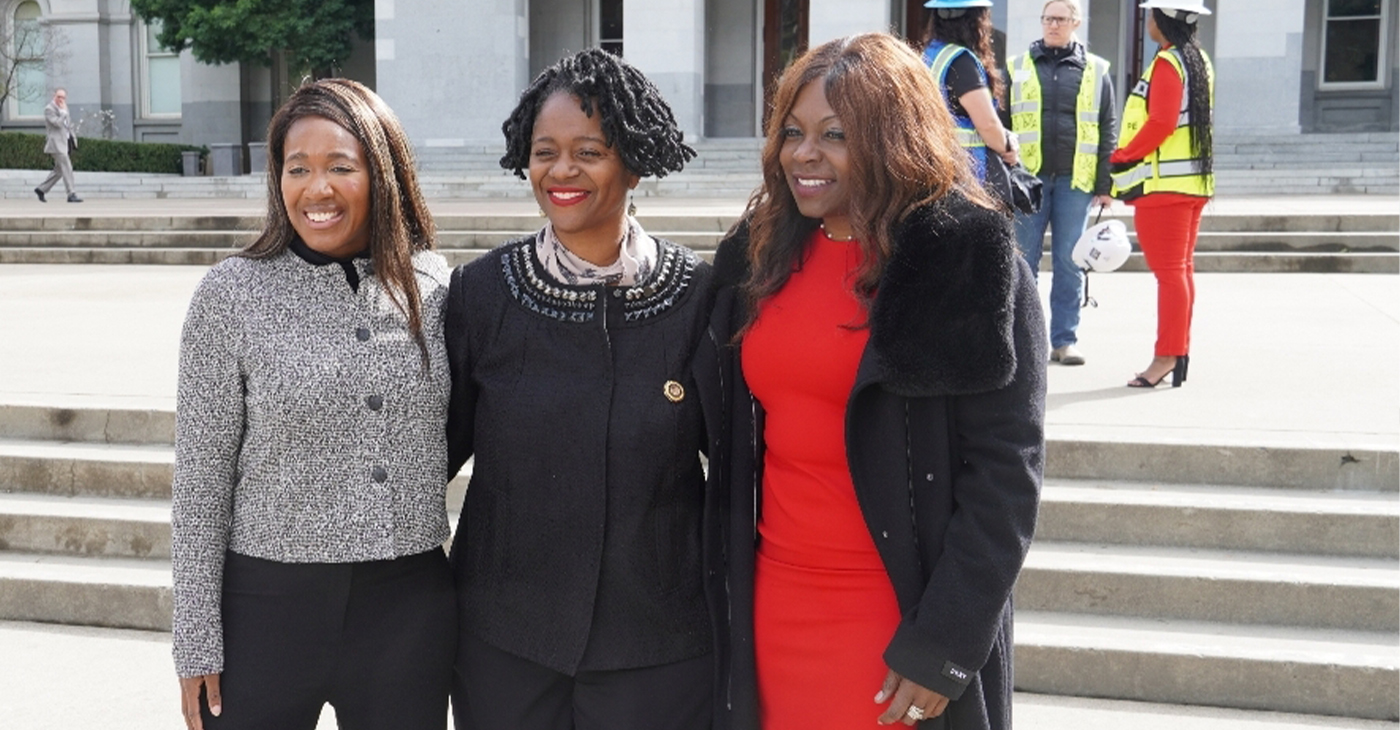
By Antonio Ray Harvey, California Black Media
To honor Women in Construction Week, Sen. Lola Smallwood-Cuevas (D-Los Angeles), a member of the California Legislative Black Caucus (CLBC), introduced Senate Concurrent Resolution (SCR) 30 in the State Legislature on March 6. This resolution pays tribute to women and highlights their contributions to the building industry.
The measure designates March 2, 2025, to March 8, 2025, as Women in Construction Week in California. It passed 34-0 on the Senate floor.
“Women play an important role in building our communities, yet they remain vastly underrepresented in the construction industry,” Smallwood-Cuevas stated. “This resolution not only recognizes their incredible contributions but also the need to break barriers — like gender discrimination.
Authored by Assemblymember Liz Ortega (D-San Leandro), another bill, Assembly Concurrent Resolution (ACR) 28, also recognized women in the construction industry.
The resolution advanced out of the Assembly Committee on Rules with a 10-0 vote.
The weeklong event coincides with the National Association of Women In Construction (NAWIC) celebration that started in 1998 and has grown and expanded every year since.
The same week in front of the State Capitol, Smallwood, Lt. Gov. Eleni Kounalakis, Assemblymember Josh Hoover (R-Folsom), and Assemblymember Maggie Krell (D-Sacramento), attended a brunch organized by a local chapter of NAWIC.
Two of the guest speakers were Dr. Giovanna Brasfield, CEO of Los Angeles-based Brasfield and Associates, and Jennifer Todd, President and Founder of LMS General Contractors.
Todd is the youngest Black woman to receive a California’s Contractors State License Board (A) General Engineering license. An advocate for women of different backgrounds, Todd she said she has been a woman in construction for the last 16 years despite going through some trying times.
A graduate of Arizona State University’s’ Sandra Day O’Connor College of Law, in 2009 Todd created an apprenticeship training program, A Greener Tomorrow, designed toward the advancement of unemployed and underemployed people of color.
“I always say, ‘I love an industry that doesn’t love me back,’” Todd said. “Being young, female and minority, I am often in spaces where people don’t look like me, they don’t reflect my values, they don’t reflect my experiences, and I so persevere in spite of it all.”
According to the U.S. Bureau of Labor Statistics, only 11.2% of the construction workforce across the country are female. Overall, 87.3% of the female construction workers are White, 35.1% are Latinas, 2.1% are Asians, and 6.5% are Black women, the report reveals.
The National Association of Home Builders reported that as of 2022, the states with the largest number of women working in construction were Texas (137,000), California (135,000) and Florida (119,000). The three states alone represent 30% of all women employed in the industry.
Sen. Susan Rubio (D-Baldwin Park) and the California Legislative Women’s Caucus supported Smallwood-Cuevas’ SCR 30 and requested that more energy be poured into bringing awareness to the severe gender gap in the construction field.
“The construction trade are a proven path to a solid career. and we have an ongoing shortage, and this is a time for us to do better breaking down the barriers to help the people get into this sector,” Rubio said.
Activism
Comparing Histories: Black and Japanese American Advocates Talk Reparations and Justice
Los Angeles-based clinical psychologist Dr. Cheryl Grills and Bay Area-based attorney Don Tamaki, who were part of the nine-member reparations panel, spoke at the “Justice Through Action: Black Reparations-Reparative Justice” event hosted by local chapters of the Japanese American Citizens League (JACL) in Sacramento on Feb. 8.
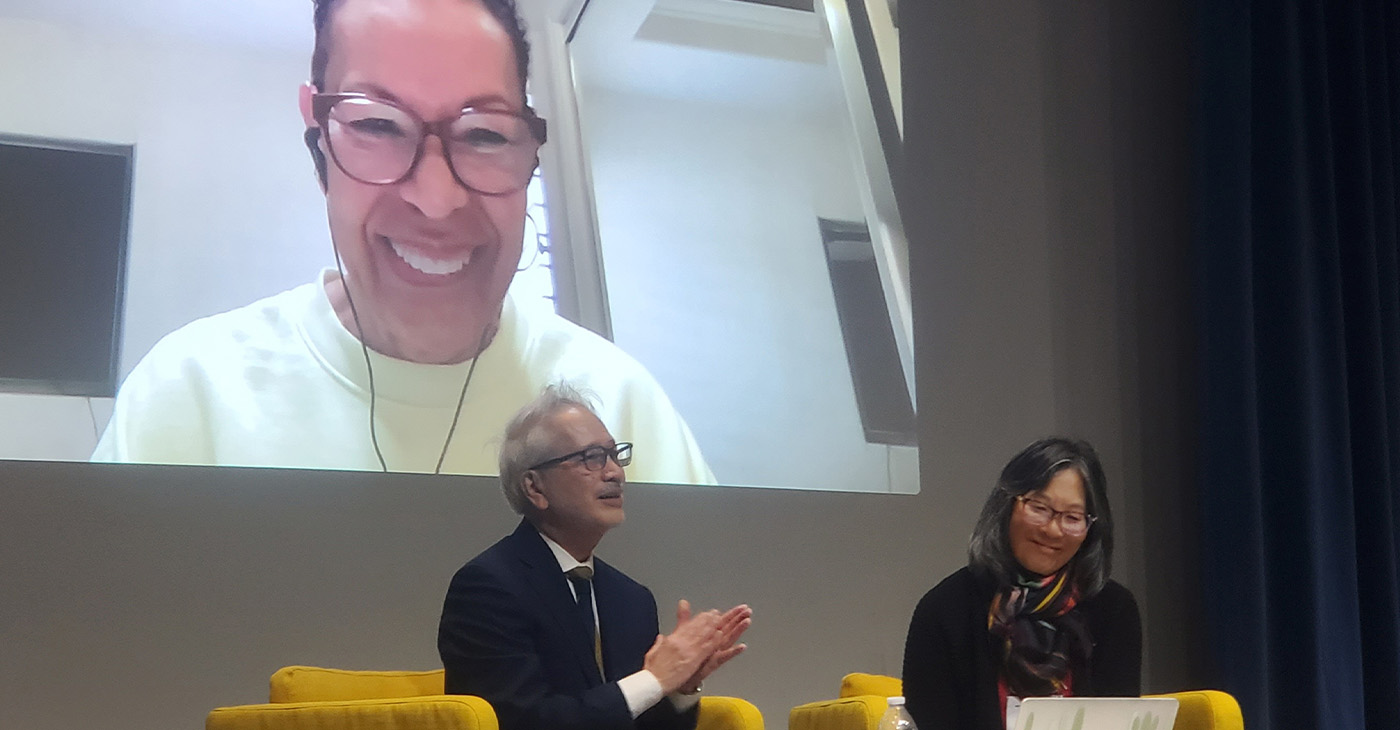
By Antonio Ray Harvey, California Black Media
Two former members of the California Task Force to Study and Develop Reparation Proposals for African Americans shared some of their experiences developing a 1,075-page report that detailed injustices suffered by African Americans during and after chattel slavery.
Los Angeles-based clinical psychologist Dr. Cheryl Grills and Bay Area-based attorney Don Tamaki, who were part of the nine-member reparations panel, spoke at the “Justice Through Action: Black Reparations-Reparative Justice” event hosted by local chapters of the Japanese American Citizens League (JACL) in Sacramento on Feb. 8.
The event was held at the California Museum.
“The first impact that the overall report had on me is that it gave me a panoramic view and it was a panoramic view of the elephant in the room,” Grills, who attended the event virtually, told the audience.
Grills said the report the task force compiled presented an undiluted version of the Black experience in America/
“You could see the totality of the elephant,” she said. “The report gives you the fullness and density of the elephant, which was, at the same time, validating, overwhelming, and painful.”
The JACL is the nation’s oldest and largest Asian American-Pacific Islander Civil Rights Organization.
The JACL presentation was hosted to observe the 83rd anniversary of Executive Order 9066, which led to the incarceration of 120,000 Japanese Americans during World War II.
That panel was part of the Northern California Time of Remembrance (NCTOR) committee’s Annual Day of Remembrance program organized in partnership with the California Museum.
Tamaki, who is Japanese American and the only non-Black member of the task force, said the Black and Japanese experiences in America have some parallels but there are significant differences as well.
“When you look at reparations, and this was the eye opener to me, it’s actually a unifying concept,” Tamaki said. “There’s no equivalence between four years in a concentration camp that our community experienced and 400 years of oppression.”
Tamaki explained, “We do have some things in common. Japanese know something about mass incarceration and profiling and the consequences. In that respect, there is a reason for all of us, whatever our background, to start looking at (reparations). We have to cure the body and not just put a band-aid on it.”
Grills is a clinical psychologist whose work focuses on community psychology. A Professor of Psychology at Loyola Marymount University, she us also a past president of the Association of Black Psychologists.
Tamaki is a senior counsel at Minami Tamaki LLP. He has spent decades working with AAPI legal services programs. In the 1980s, he participated in the Japanese American reparations movement and served on the pro bono legal team that reopened the landmark 1944 Supreme Court case of Fred Korematsu.
The case resulted in overturning Korematsu’s criminal conviction for violating the incarceration order that led to the imprisonment of 125,000 Japanese Americans after the attack on Pearl Harbor.
Earnest Uwazie, a Sacramento State University criminal justice professor and director of the Center for African Peace and Conflict Resolution, was one of more than 100 persons who listened to the two-hour discussion.
“It’s always great to hear from the people involved in the study of reparations and it is good to get a comparative with the Japanese experience,” said Uwazie. “This was extremely informative.”
Activism
Conscious Reflection: Black Caucus Observes MLK Day Amid California Firestorms
Vice-chair of the CLBC Assemblymember Issac Bryan (D-Ladera Heights) shared with the diverse crowd attending the breakfast that he and Chair, Sen. Akilah Weber-Pierson (D-La Mesa), received numerous messages inquiring whether the event would be called off because of the fires.
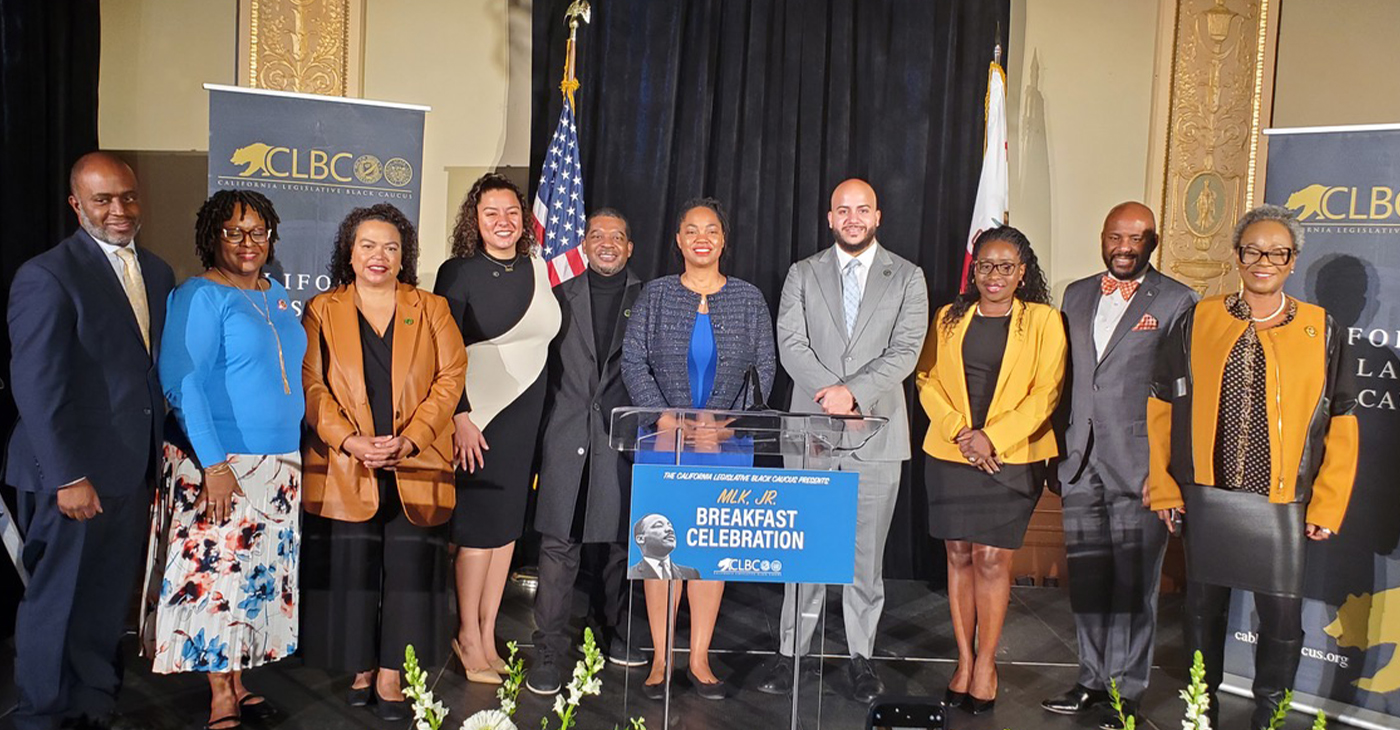
By Antonio Ray Harvey, California Black Media
Amid the damage and despair caused by firestorms in the Los Angeles area, the California Legislative Black Caucus (CLBC) held its annual Dr. Martin Luther King, Jr. Breakfast in Sacramento on his birthday, Jan. 15.
All 12 members of the CLBC attended the event, including six Black lawmakers from the Los Angeles region who expressed their deep concerns about constituents displaced or impacted by the fires.
Vice-chair of the CLBC Assemblymember Issac Bryan (D-Ladera Heights) shared with the diverse crowd attending the breakfast that he and Chair, Sen. Akilah Weber-Pierson (D-La Mesa), received numerous messages inquiring whether the event would be called off because of the fires.
Bryan said it was important to move forward with the celebration considering the disaster’s aftermath and the transfer of presidential transition happening in Washington on Jan. 20.
“Hell no, we are not canceling the breakfast,” Bryan said he told callers. “We need to think about the legacy and impact of Martin Luther King, Jr., more than ever. In fact, he would be ashamed if we canceled this breakfast a week before (Donald) Trump takes office.”
The event was held at the Elk’s Tower three blocks north of the State Capitol under the theme, “Black Power, Progress, and Purpose.” Martin Luther King would have turned 96 on the day of the event.
It marked the first time that all CLBC members were in the same room since the 2025-2026 legislative session began in December.
The CLBC holds the event each year to honor the legacy of Dr. King and the celebrate the Caucus’ commitment to service in Black communities across the state.
Speakers included California Secretary of State Shirley Weber and Attorney General Rob Bonta.
Black California constitutional officers — State Controller Malia Cohen and State Superintendent of Public Instruction Tony Thurmond — also attended the event.
“This annual gathering is not only a time for reflections but also a time for renewal (and) a moment to recommit to the values that Dr. King fought and gave his life for,” Weber-Pierson said during her remarks.
The keynote speaker was Lurie Daniel-Favors, who serves as Executive Director at the Center for Law and Social Justice (CLSJ) at Medgar Evers College in New York. The CLSJ is a community-based legal organization that specializes in addressing racial injustice.
“We are in a time and place where the whole world has shifted and the Supreme Court has stepped in and we are returning to what I like to call the ‘Jim Crow’ era of jurisprudence when it comes to Civil Rights, social justice, and advancing equity for the nation,” Daniel-Favors added.
The breakfast celebration featured a drum dance performance by David Bowman and Company, the singing of the Black National Anthem “Lift Ev’ry Voice and Sing” by Olevia Wilson, and additional musical selections by Huie Lovelady and a community choir.
“Many don’t realize the fact that the (CLBC) caucus was the first ethnic caucus in the nation. Eventually, other caucuses were formed,” Secretary of State Weber reminded the guests. “We are proud of the fact that this caucus has been in existence for over 55 years and has served and served well during the hard times in between.”
-

 #NNPA BlackPress4 weeks ago
#NNPA BlackPress4 weeks agoTarget Takes a Hit: $12.4 Billion Wiped Out as Boycotts Grow
-

 Activism3 weeks ago
Activism3 weeks agoUndocumented Workers Are Struggling to Feed Themselves. Slashed Budgets and New Immigration Policies Bring Fresh Challenges
-

 #NNPA BlackPress4 weeks ago
#NNPA BlackPress4 weeks agoBREAKING Groundbreaking Singer Angie Stone Dies in Car Accident at 63
-
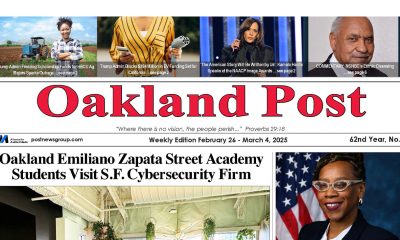
 Activism4 weeks ago
Activism4 weeks agoOakland Post: Week of February 26 – March 4, 2025
-

 Arts and Culture3 weeks ago
Arts and Culture3 weeks agoBeverly Lorraine Greene: A Pioneering Architect and Symbol of Possibility and Progress
-

 #NNPA BlackPress4 weeks ago
#NNPA BlackPress4 weeks agoNAACP Legend and Freedom Fighter Hazel Dukes Passes
-

 #NNPA BlackPress4 weeks ago
#NNPA BlackPress4 weeks agoTrump Kicks the Ukrainian President Out of the White House
-

 #NNPA BlackPress4 weeks ago
#NNPA BlackPress4 weeks agoApple Shareholders Reject Effort to Dismantle DEI Initiatives, Approve $500 Billion U.S. Investment Plan






















































